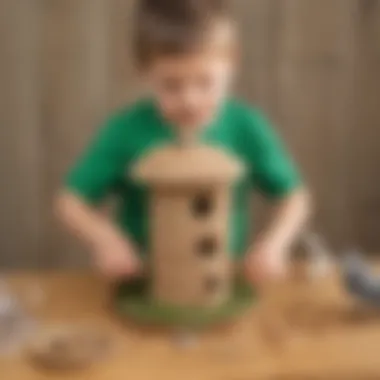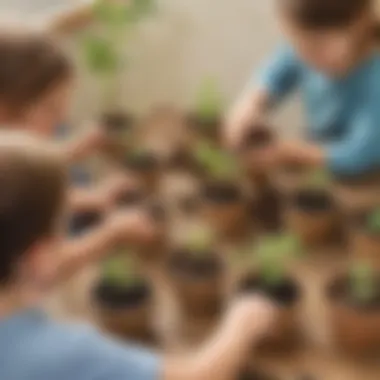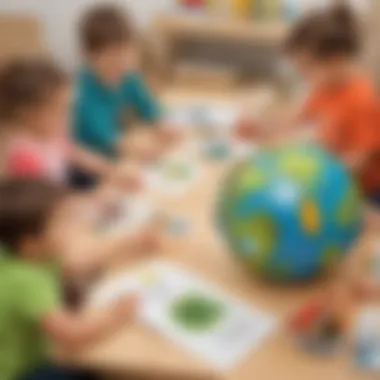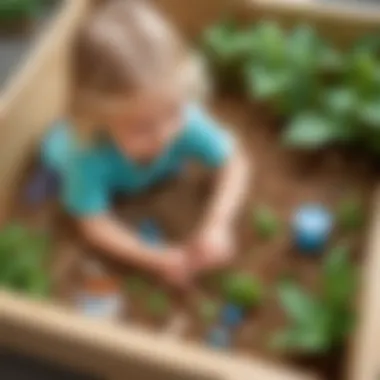Exploring Eco-Friendly Fun: Innovative Earth Day Projects for Preschoolers


Fun Activities Ideas
Engaging preschoolers in Earth Day projects is an excellent way to cultivate a sense of environmental responsibility from a young age. Through various fun activities, children can explore the importance of sustainability and conservation. Indoor activities can include planting seeds in recyclable containers, watching them grow, and learning about the lifecycle of plants.
Outdoor adventures offer opportunities for hands-on learning in nature. Children can participate in garden clean-ups, bird watching, or creating nature collages using leaves and flowers they collect responsibly. These activities not only promote a connection with the environment but also foster a sense of stewardship.
Arts and crafts projects can involve using recycled materials to create Earth-themed artwork, such as making DIY bird feeders from milk cartons or designing reusable tote bags with environmentally friendly messages. These creative endeavors encourage imagination and reinforce the importance of reducing waste.
Science experiments tailored for preschoolers can focus on simple concepts like water conservation or recycling. Through activities like building homemade bird baths to conserve water or sorting everyday items into recyclables and non-recyclables, children can grasp the fundamentals of environmental stewardship in a hands-on way.
Cooking and baking activities can also tie into Earth Day themes by using locally sourced or organic ingredients. Children can be involved in preparing Earth-friendly snacks, such as planting herbs in a small garden and using them to season dishes, promoting sustainability and healthy eating choices.
Educational Games
To further engage preschoolers in environmental awareness, incorporating educational games can be both informative and entertaining. Math and logic games can include activities like counting seeds for planting or solving puzzles that teach the concept of recycling.
Language and vocabulary games can focus on Earth-related words, such as plant names or types of animals. Using interactive storytelling or rhyming games, children can expand their vocabulary while learning about the natural world.
Engaging preschoolers in STEM activities introduces them to scientific concepts in a fun way. Projects like building a small terrarium or investigating the different properties of materials can spark curiosity and a love for learning about the environment.
History and geography puzzles can be incorporated to show children the interconnectedness of the world. Activities like mapping out local flora or learning about indigenous cultures emphasize the importance of respecting diverse ecosystems and traditions.
Interactive learning apps provide a digital avenue for exploring environmental themes. Apps that feature wildlife conservation challenges or virtual tours of national parks offer children a dynamic and interactive way to learn about the planet and its diverse ecosystems.
Seasonal and holiday activities can also be infused with Earth Day messages, aligning celebrations with eco-conscious themes. Valentine's Day crafts can involve making biodegradable planters or creating cards from recycled materials, emphasizing the importance of sustainable practices.
Parenting tips and resources play a crucial role in supporting the development of eco-conscious habits in children. Encouraging creativity through open-ended play allows children to explore their environmental interests and express their ideas freely, fostering a sense of ownership in learning about sustainability.
Setting up a playful learning environment that integrates nature-inspired elements provides children with a sensory-rich experience, encouraging them to engage with the environment in meaningful ways. Balancing screen time and playtime is essential in nurturing a well-rounded individual who values outdoor exploration and hands-on experiences.
Building strong family bonds through shared eco-friendly activities like planting a family tree or going on nature hikes fosters a sense of community and collective responsibility for the environment. By engaging in these activities together, families can create lasting memories while instilling values of sustainability in their children.
Motivating kids to stay active can also tie into environmental awareness, as outdoor play and physical activity in natural settings can deepen a child's appreciation for the world around them. Encouraging children to explore local parks, go on nature scavenger hunts, or participate in community clean-up initiatives promotes a sense of connection to the environment.


Fun facts and trivia offer an additional layer of engagement for preschoolers interested in learning more about the natural world. Exploring the wonders of the animal kingdom, from the depths of the ocean to the heights of the skies, can spark curiosity and ignite a passion for wildlife conservation.
Delving into the stories behind famous inventions, such as the development of solar energy or eco-friendly technologies, showcases the power of human innovation in creating sustainable solutions for the planet. By understanding these inventions, children can appreciate the importance of technological advancements in promoting environmental stewardship.
Exploring historical events tailored for kids, like the creation of the national parks system or the origins of Earth Day, offers insights into how past actions have shaped our current environmental landscape. Learning about significant events in environmental history can inspire children to take an active role in preserving our planet for future generations.
Unveiling the mysteries of mythical creatures through storytelling and imaginative play can captivate young minds and inspire a sense of wonder about the natural world. By engaging with folklore and mythical beasts, children can develop an appreciation for the interconnectedness of nature and cultural storytelling traditions.
Embarking on space adventures and discoveries introduces children to the vastness of the cosmos and the importance of protecting Earth as our home in the universe. Learning about celestial bodies, space missions, and the wonders of the night sky can instill a sense of curiosity and awe in preschoolers, encouraging them to be stewards of our planet.
Introduction
In today's modern world, where environmental issues are at the forefront of global discussions, educating the younger generation about the significance of Earth Day holds immense importance. This article delves into a myriad of innovative Earth Day projects specially curated for preschoolers, with the primary objective of instilling a sense of environmental consciousness and sustainability from a tender age. By immersing young learners in creative and interactive activities, these projects serve as the building blocks for nurturing a generation of environmentally responsible citizens.
As we embark on this exploratory journey of Earth Day initiatives tailored for preschoolers, it is imperative to recognize the pivotal role early education plays in shaping children's perspectives towards nature and the planet. Through engaging projects and hands-on experiences, young minds are not only introduced to basic eco-friendly practices but also encouraged to develop a deep-rooted connection with the environment around them. Each project serves as a stepping stone towards fostering a sense of responsibility and stewardship towards our planet, laying a solid foundation for a sustainable future.
With a strong emphasis on experiential learning, these Earth Day projects are meticulously designed to cater to the developmental needs of preschoolers, integrating elements of play, exploration, and discovery. By combining educational content with interactive tasks, children not only learn about environmental concepts but also actively engage in applying them in real-life scenarios. This holistic approach towards learning not only enhances their cognitive abilities but also nurtures a sense of empathy and understanding towards nature and the world we inhabit.
In a world characterized by rapid environmental degradation and climate change, early exposure to eco-conscious practices and sustainability initiatives is crucial in shaping the attitudes and behaviors of future generations. By introducing preschoolers to these innovative Earth Day projects, we pave the way for a greener, more environmentally conscious tomorrow filled with empowered individuals actively contributing towards a healthier planet.
Importance of Earth Day Education
Earth Day Education holds immense significance in the context of this article, aiming to cultivate environmental consciousness and sustainability among preschoolers from a tender age. By integrating Earth Day themes into early education, children are exposed to crucial concepts such as environmental protection, conservation, and respect for nature. This not only lays a foundation for embracing eco-friendly practices but also fosters a sense of responsibility towards the planet's well-being. Additionally, Earth Day Education plays a pivotal role in shaping eco-conscious habits that can be carried forward into adulthood, making it a key component in early childhood development with long-lasting effects.
Raising Environmental Awareness
Engaging children in eco-conscious practices
Engaging children in eco-conscious practices involves immersing young learners in hands-on activities that promote environmental stewardship. By incorporating interactive projects like recycling crafts, tree planting, or eco-themed games, children not only grasp the importance of sustainability but also actively participate in creating positive environmental change. The key characteristic of engaging children in eco-conscious practices lies in its ability to make complex environmental issues relatable and accessible to young minds. This approach is beneficial for this article as it bridges the gap between abstract concepts and concrete actions, empowering children to become eco-conscious individuals. Furthermore, the unique feature of this method is its ability to instill values of environmental responsibility in a fun and engaging manner, fostering a deeper connection with nature through immersive experiences.
Teaching Sustainability
Instilling eco-friendly habits early on
Teaching sustainability involves ingraining eco-friendly values and practices from the onset of a child's development. By introducing concepts like recycling, energy conservation, and mindful consumption at an early age, children learn to make conscious choices that benefit the environment. The key characteristic of instilling eco-friendly habits early on is its capacity to shape lifelong behaviors that prioritize sustainability. This makes it a popular choice for this article as it aligns with the goal of nurturing eco-consciousness in preschoolers. Additionally, the distinctive feature of this approach is its proactive nature in fostering a sense of environmental guardianship, empowering children to become stewards of the planet for future generations.


Promoting Nature Appreciation
Connecting preschoolers with the environment
Promoting nature appreciation involves creating meaningful connections between preschoolers and the natural world around them. Through outdoor activities, nature walks, and interactive lessons on ecosystems, children develop a profound respect and admiration for the environment. The key characteristic of connecting preschoolers with the environment lies in cultivating a sense of wonder and curiosity towards nature, encouraging children to explore and appreciate the beauty of their surroundings. This choice is beneficial for this article as it instills a deep-rooted love for nature, nurturing a sense of environmental responsibility early on. Moreover, the unique feature of this approach is its ability to foster empathy and understanding towards the natural world, empowering children to become advocates for environmental conservation and biodiversity preservation.
Creative Earth Day Projects
Ensuring that preschoolers engage in creative Earth Day projects is paramount in cultivating a sense of environmental responsibility from a young age. These projects serve as valuable tools in instilling concepts of sustainability and nature appreciation. By integrating hands-on activities and interactive learning experiences, preschoolers can grasp foundational environmental principles in a fun and accessible manner. Creative Earth Day projects not only spark curiosity but also foster a deep connection with the natural world.
Planting Seeds of Change
Creating mini herb gardens
Creating mini herb gardens serves as a practical and engaging way to teach preschoolers about plant growth and care. By involving children in planting and nurturing small herbs, they learn firsthand about the importance of taking care of plants and the environment. Mini herb gardens provide a hands-on experience that nurtures a sense of responsibility and curiosity towards nature. Their compact size makes them ideal for classrooms or homes, offering a tangible example of sustainable practices in action.
Learning about the plant life cycle
Learning about the plant life cycle offers a comprehensive understanding of how plants grow and develop. Preschoolers can observe seeds sprouting, plants maturing, and eventually producing new seeds, gaining insights into the interconnectedness of living organisms. This hands-on exploration not only teaches specific botanical concepts but also instills a respect for nature's cycles. Understanding the plant life cycle contributes to a broader understanding of sustainability and the importance of preserving natural ecosystems.
Recycling Crafts
Using recycled materials for art projects
Incorporating recycled materials into art projects not only promotes creativity and artistic expression but also raises awareness about the importance of recycling and waste reduction. Preschoolers learn to see discarded items as valuable resources for creating new artworks, instilling a sense of environmental responsibility early on. Using recycled materials sparks imagination and resourcefulness, encouraging children to rethink their consumption habits and engage in sustainable practices.
Eco-Friendly Sensory Bins
Exploring textures with natural elements
Eco-friendly sensory bins provide a sensory-rich experience for preschoolers while connecting them with the natural world. By incorporating elements like sand, leaves, and stones, children engage in tactile exploration that stimulates their senses and encourages a deeper connection with the environment. Exploring textures with natural elements fosters sensory development and enhances nature appreciation, allowing children to experience the wonders of the outdoors in a hands-on and immersive way.
Nature Scavenger Hunt


Encouraging outdoor exploration
A nature scavenger hunt offers an exciting way for preschoolers to explore outdoor environments while learning about local flora and fauna. Engaging in this activity encourages observation skills, curiosity, and environmental appreciation as children hunt for natural treasures. Nature scavenger hunts promote active learning through hands-on experiences in nature, fostering a sense of wonder and curiosity about the world around them.
Upcycled Bird Feeders
Creating bird feeders from household items
Making bird feeders from household items provides a dual benefit of feeding local birds while repurposing materials that might otherwise go to waste. Preschoolers can participate in assembling these feeders, learning the importance of providing for wildlife and practicing sustainability through upcycling. Creating bird feeders promotes empathy for animals and environmental stewardship, instilling a sense of responsibility towards caring for local ecosystems.
Educational Benefits
In the realm of preschool education, emphasizing the educational benefits of Earth Day projects holds significant merit. These projects serve as powerful tools for introducing young children to environmental concepts in a tangible and engaging manner. By incorporating hands-on activities like planting seeds and creating recycled crafts, preschoolers can develop a deeper understanding of the importance of sustainability and nature conservation. Moreover, these projects help enhance cognitive functions, fine motor skills, and social awareness in children, laying a solid foundation for their future learning and environmental consciousness.
Cognitive Development
Enhancing problem-solving skills
Focusing on enhancing problem-solving skills through Earth Day projects enables preschoolers to engage in critical thinking and decision-making processes. This aspect emphasizes the importance of analytical reasoning and creative problem-solving abilities from a young age. By designing activities that require children to think innovatively, such as devising solutions for recycling materials or creating eco-friendly art, their cognitive development is stimulated. Problem-solving skills play a crucial role in shaping a child's ability to navigate challenges, fostering resilience and adaptability essential for their overall growth and development.
Social Awareness
Fostering empathy towards the environment
Inculcating empathy towards the environment through Earth Day projects nurtures a sense of responsibility and care for the world around us. By focusing on fostering empathy towards the environment, preschoolers learn to appreciate and respect nature. This aspect encourages children to consider the impact of their actions on the environment, promoting a sense of connectedness and stewardship. Developing social awareness at a young age cultivates a compassionate and environmentally conscious mindset, shaping children into responsible global citizens who value and protect the Earth.
Fine Motor Skills
Improving hand-eye coordination through art activities
Engaging in art activities aimed at improving hand-eye coordination benefits preschoolers in multiple ways. By encouraging children to participate in fine motor skill exercises like cutting, pasting, and drawing, these projects enhance their dexterity and precision. Improving hand-eye coordination through art activities lays a foundation for proficient writing and manipulation of objects, essential skills for academic and daily life tasks. This aspect not only refines their motor abilities but also fosters creativity and self-expression through artistic endeavors, enriching their overall developmental journey.
Conclusion
The essence of the conclusion lies in its ability to encapsulate the core themes elucidated throughout the article. By reiterating the critical importance of fostering environmental consciousness and sustainability in young children, the conclusion crystallizes the overarching objective of introducing innovative Earth Day projects in the preschool curriculum.
Moreover, the conclusion acts as a call to action, urging educators, parents, and guardians to embrace and implement these creative initiatives within the realm of preschool education. By emphasizing the tangible benefits that accrue from engaging in such projects, the conclusion motivates stakeholders to prioritize environmental education and instill eco-friendly practices from a tender age.
Furthermore, the conclusion serves as a bridge between theory and practice, encouraging practical application and integration of the discussed Earth Day projects into the daily routine of preschoolers. By elucidating the seamless integration of these projects into the educational milieu, the conclusion paves the way for a sustainable paradigm shift towards environmental stewardship and awareness.
In essence, the conclusion acts as a beacon of inspiration and guidance, illuminating the path towards a more environmentally conscious and sustainable future for the younger generation. As the final crescendo in this symphony of innovative Earth Day projects, the conclusion underscores the transformative power of early environmental education and sets the stage for cultivating a generation of eco-conscious global citizens.



